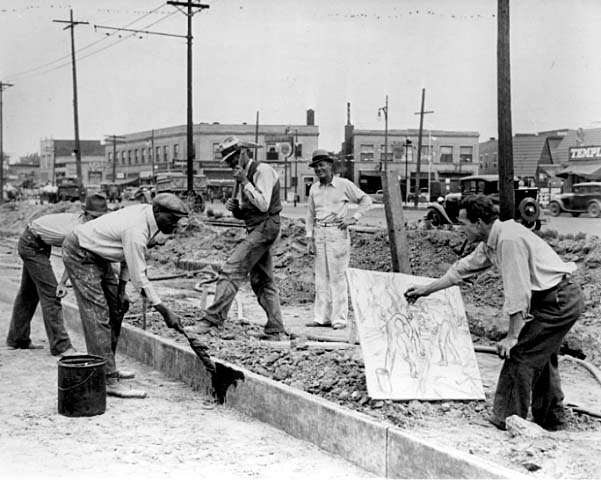Unemployment would be completely ended with a program that would give every America who wanted a job employment with the federal government, which would pay $15 per hour, plus health care benefits.
That is the proposal of Sen. Bernie Sanders (I-Vt). Two other potential Democratic presidential nominees, Sen. Cory Booker (D-NJ) and Sen. Kirsten Gillibrand (D-NY), also came out for federally-guaranteed jobs.
Under Sen. Sanders’ plan, the Americans thus employed by the federal government would work to rebuild the national infrastructure, offer daycare for children, improve the environment, and help teachers in schools. The program would include job training.
“The goal is to eliminate working poverty and involuntary unemployment altogether,” said leftist economist Darrick Hamilton. “This is an opportunity for something transformative, beyond the tinkering we’ve been doing for the last 40 years, where all the productivity gains have gone to the elite of society.”
A spokesman for Sen. Sander’s office said that the cost of the program and plans for funding it had yet to be determined.
See Bernie Sanders to announce plan to guarantee every American a job in the Washington Post.
Now let’s think about this. Here in rural Oklahoma, there aren’t many hourly jobs that pay as much as $15 per hour. That includes our factories, warehouses, and service industries. Amazon starts off its distribution center workers at $11.50 an hour in Chattanooga, Tennessee, and $13.75 an hour in Kent, Washington, near its headquarters. The starting wage at Costco, considered a good employer, is $13.50.
So if the government is offering $15, that would drain off workers from the private sphere. Indeed, the plan is intended to force private employers to match or exceed the $15 rate, thus, in effect, raising the minimum wage to that level.
Amazon and other big corporations could probably absorb that, though such a spike in labor expenses would probably accelerate their automation plans, resulting in job cuts that would add to the numbers in the government program. But many small businesses, especially in small town, would go under.
Also, what will it mean if the government is going to use its massive pool of labor to rebuild our national infrastructure? We aren’t going to contract the work out to private companies? That would mean the government would need to invest vast sums in heavy equipment and engineering professionals (who command much more than $15 per hour). And steel workers, heavy equipment operators, and other specialized construction trades are among the hourly workers who also make more than $15 per hour.
It isn’t easy to build bridges or grade roads. Or, for that matter, teach in classrooms or clean up the environment. Most of the chronically unemployed whom this program would target have low skills. Plans for the program indicate that they will be paid to take job training classes–another expensive undertaking to staff and operate nationwide–but some people just do not function very well in the classroom.
As far as how to pay for this, especially on top of all of the other programs Democrats are proposing, is a rather important question. I suspect that taxing the rich, the Democrats’ solution for everything, is not going to be enough, even if you confiscate everything they have.
Private companies pay workers for their productivity. They make products or offer services that earn the company money, which is where the money comes to pay for the workers. Labor costs are set by supply and demand.
Paying workers a set rate apart from any consideration of productivity, where the labor expense is a net cost to the government, with no sales of goods or services to cover the expense, seems economically impossible.
I know that Sen. Sanders is a socialist, but even socialists have to work in terms of the economic laws. In the Soviet Union, the state took over ownership of the means of production, so that workers continued to manufacture products in government-owned factories. Sen. Sanders has said he wants to emulate the social democracy of the Scandinavian countries, but all of them depend on private companies to provide employment for their citizens and they pursue policies to help them do so.
And this universal job program at wages higher than the private sector goes far beyond the W.P.A. program during the Depression, which I’m sure Democrats will compare it to. The W.P.A. was temporary by nature and was phased out when the labor demands of the private sector during World War II made it superfluous.
Am I missing something? How could Democrats seriously consider a program like this?
Photo: W.P.A. Construction Workers, being sketched by Alfred Castagne, a W.P.A artist, by W.P.A. photographer, Public Domain, https://commons.wikimedia.org/w/index.php?curid=355590

















